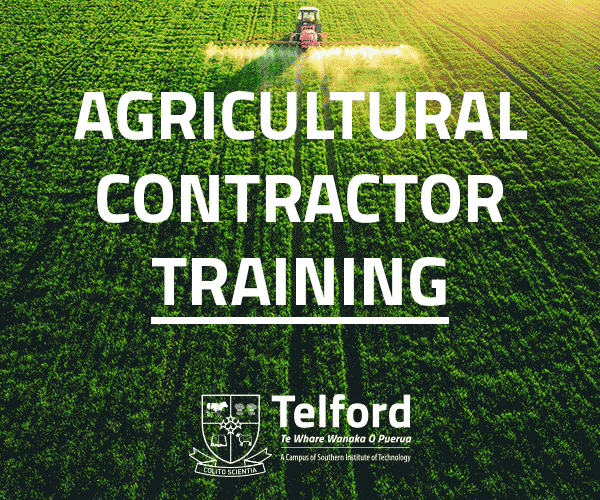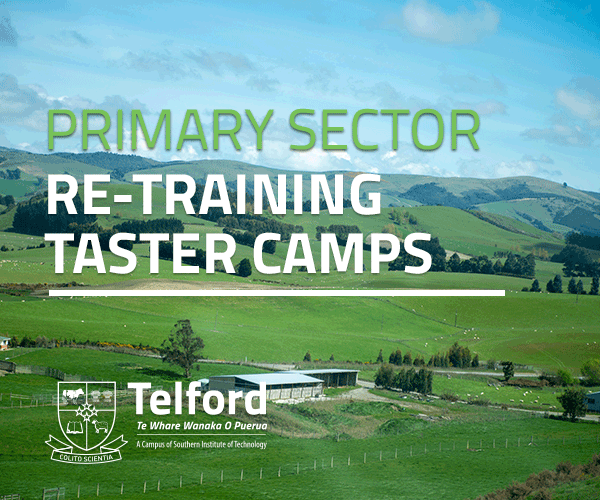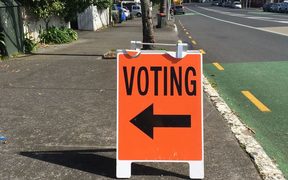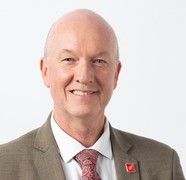Election 2020: National candidate Penny Simmonds makes first bid for Invercargill electorate
Marjorie Cook
05 August 2020, 9:00 PM
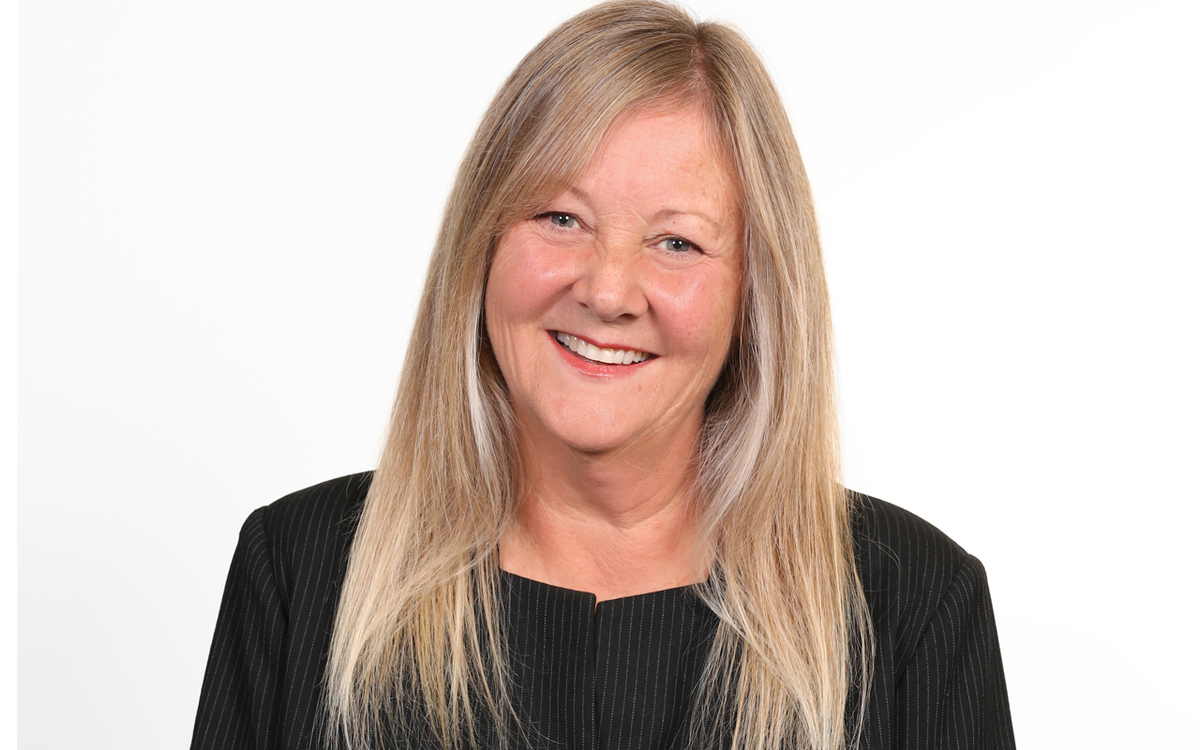 National Party Invercargill electorate candidate Penny Simmonds. PHOTO: Supplied
National Party Invercargill electorate candidate Penny Simmonds. PHOTO: SuppliedBanging up hoardings in the frost, holding swedes for a photo: it must be election time in Southland.
The nation begins a six week countdown to the September 19 voting deadline when Parliament rises at the end of this week.
But National Party candidate for Invercargill, Penny Simmonds, has been on the campaign hustle since the party announced her selection in May.
Invercargill is regarded as a National Party safe seat, with the present incumbent - National MP Sarah Dowie – retiring at the election after two terms in office.
Ms Simmonds has taken temporary leave from her role as Southern Institute of Technology chief executive, a position she has held for 23 years. If elected, she will resign.
Invercargill, population 56,200, is a 999km drive south from Parliament’s home in Wellington.
While it might be a long way from the debating chamber, New Zealand’s most southern city and its rural hinterland have rarely been out of the national spotlight this year.
First there were floods, then the COVID-19 flu pandemic shutdown, then a wedding celebrated at Bluff became New Zealand’s biggest COVID-19 cluster. Important events were cancelled, borders closed, tourists stopped coming, businesses closed, students went home and job cuts began.
Just when you thought it couldn’t get any worse, Rio Tinto gave 14 months’ notice on the Tiwai Point aluminium smelter, impacting an estimated 2600 jobs.
That resulted in a visitation from Prime Minister Jacinda Ardern and members of her Labour-led Government caucus for urgent talks with the region’s mayors and leaders.
“It is going to be interesting but still it is a challenge worth being up for,” Ms Simmonds laughed, when contacted by the Southland App this week. (August 3)
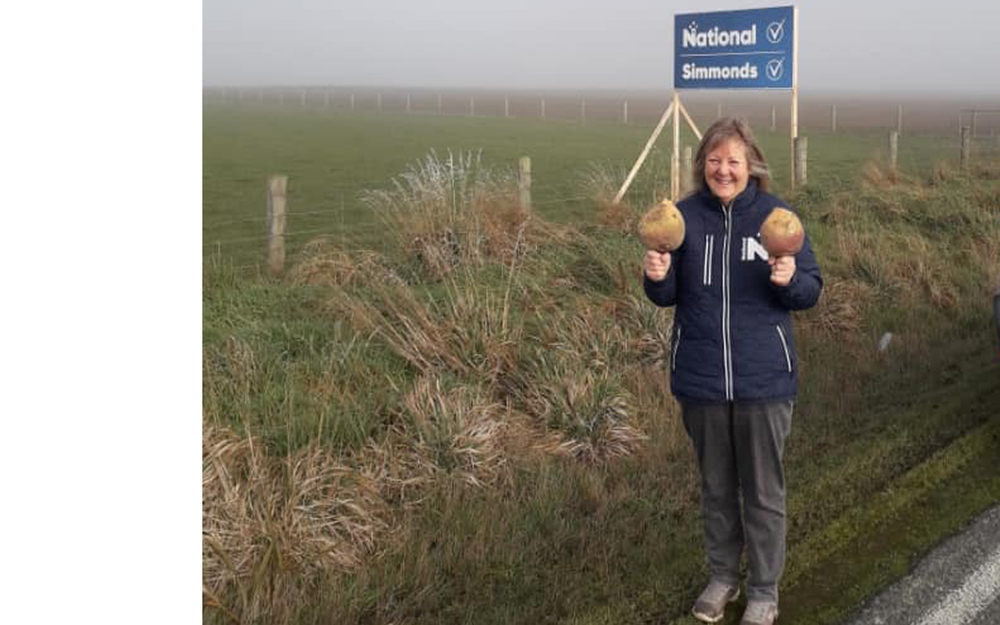
Penny Simmonds has been on the campaign trail since May. PHOTO: SUPPLIED
Despite the horrible start to 2020, Ms Simmonds believes the Invercargill electorate and Southland region has a bright future and can pull itself out of the doldrums through innovation, technology and education.
“I see Southland having a bright future under a National Government because a National Government understands how important primary industries are to New Zealand.
“I think that it will be a big challenge under a Labour Government, in that it has taken until Covid to understand how important the primary sector is to New Zealand. It’s going to be absolutely critical to have our primary sector to be at full productivity in coming years if we are going to be able to pay back all this debt. I don’t see a Labour Government understanding how the regulatory environment can impact on the productivity of our primary sector,” she said.
This year’s general election is Ms Simmonds’s first foray into politics.
The married mother of three grew up on a farm at Riversdale, in Northern Southland, and has farmed with her husband Marty Irwin for 36 years. The couple has a diary support farm at Mabel Bush and previously farmed at Te Tipua, near Mataura.
She studied science and then worked at the Southland District Council before taking on a management role at the Southern Institute of Technology (SIT) 30 years ago.
Outside her education role, she’s served a large number of organisations, earning a Companion of the New Zealand Order of Merit in 2016.
She decided to put her hand up for broader leadership because she was concerned about the region’s primary and education sectors and its economic future once the Tiwai Point aluminium smelter closes.
“I hadn’t had any burning desire to be a politician. But I do have a very strong passion and desire to stand up for Southland... I have been doing that over many years in sport and education and that’s what’s led me to this next stage,’’ she said.
Ms Simmonds has been a trail blazer for education in the south, establishing the innovative zero free scheme at the Southern Institute of Technology, introducing a distance learning programme and then forging connections between SIT’s international students and the community.
In 2000-2001, she was awarded a Woolf Fisher Fellowship for excellence in education and used it to explore what was happening in the tertiary sector of remote Nova Scotia, in Canada.
The SIT zero fees scheme had just come in and Nova Scotia introduced her to new ideas and models for distance learning, which resulted in Invercargill’s SIT2LRN programme (pronounced sit to learn).
“Nova Scotia is, of course, quite an isolated part of Canada and they delivered the tertiary distance learning from Nova Scotia for Canada and it just showed what could be done with technology even back then in the early 2000s,’’ she said.
The SIT2LRN faculty went on to prove its worth to tertiary students during the COVID-19 lock down period “because we were so far ahead of everyone else", she said.
Ms Simmonds is concerned about recent Labour-led education reforms to merge New Zealand’s 16 polytechnics into one, with a head office in Hamilton. National has promised to wind the legislation back and return autonomy to regional polytechnics.
“A lot of the decision making will occur outside of the region. The next two years is just a transition period and after that it will be entirely one organisation... It is likely to stifle innovation and to undo things we have done over the last two decades,” Ms Simmonds said of the reform.
Since beginning her campaign, Ms Simmonds has met organisations and people, visited retirement homes, called on accounting and law firms, joined farm discussion groups, and attended community meetings.
What she is hearing from constituents “reinforces how concerned our primary sector is with the direction of this current Government’,’ she said.
“[There’s been] a lot of feedback from the primary sector; a lot of concern about the amount of debt the Government is getting our country into and without any clear indication of how they might get us out of that debt; a lot of concern that the money is not going into areas that are going to make us more productive to be able to be in a better position to pay back the debt; that it is being spent in areas that it looks like votes are important to buy. People are not seeing the logic in the expenditure,” she said.
National was aware of the importance of the Tiwai Point smelter to the national economy, she said.
“National doesn’t know what the negotiations were between the Government and Rio Tinto so we don’t know what was asked for and what was offered but we do know that Tiwai contributes about $450 million into New Zealand’s economy each year.
“That is through taxes paid through workers and transmissions charges and electricity charges. We know that is a lot of money. We know that if Tiwai is closed in August next year the power is not going to go anywhere else. It is going to take half a billion dollars and five to eight years to build transmission lines to shift the power north. And even then, half of it will be lost in transmission,” she said.
However, the Tiwai closure was part of a bigger challenge facing New Zealand’s energy-intensive heavy industry sector, she said.
“We are concerned about the regulatory settings for all our energy intensive industries because NZ Steel is under strategic review now, as is the refinery at Marsden Point. National does not want to see heavy industry being closed or lost to New Zealand and we need to have a look at the statutory regulations around those and see how we can keep these industries sustainable," she said.
The Southland App asked: If National won the election, would it be able to negotiate a longer transition period for the smelter closure?
“Well, I think National will be wanting to look right across the energy intensive sector, because it is more than just Tiwai. Certainly Tiwai is really important to us down here but equally, NZ Steel is important to Northland and the refinery is important to Auckland, so it is a matter of looking at those regulatory settings and seeing if they are fit for purpose for the period we are in at the moment, in needing to retain employers,’’ Ms Simmonds said.
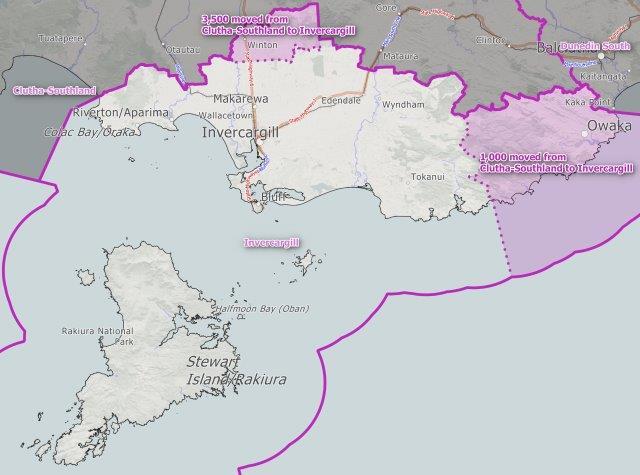
The new Invercargill electorate, as created during recent boundary changes.
One of the most talked about “things that Southland could do’’ to counter the loss of the smelter is to launch an offshore aquaculture industry.
Ms Simmonds has been involved with Southland’s regional development strategy since 2015 and says this project “is more than everyone getting on board".
It also needs enabling legislation, which has not been forthcoming.
“The comparison is with Tasmania, who produces four times the amount of aquaculture products than New Zealand does, and that is because they put legislation in place to be able to do that... That’s a frustration I think at the moment. Everyone is making comments about aquaculture being the thing for us to do but until we get that legislation in place, that has to be driven by the Government of the day... There is nothing even started to get that in place and that is really frustrating for us,” she said.
When not campaigning, Ms Simmonds’ spare time is filled with family activities, farming and gardening.
Hockey was her main sport from childhood until she retired from the game in her 40s.
She played centre half at provincial level and at national level for indoor hockey. She was also an age group triallist in outdoor hockey and later became an administrator with Hockey Southland and Hockey NZ.
“Our family have been involved in it for years. I had three aunties that played for New Zealand, two of them captained New Zealand, and so our whole family was around the field. I just love the competitiveness of it and also it is a sport that any age can play and families can be involved together, male, female, young children right up to Masters. I think it is a great sport."
She is looking forward to the challenge of leading Invercargill through a period of big change.
“Industries like Tiwai, the ability for industries like SIT to continue growing and have more international students, those things are all going to be important to Invercargill and again I don’t see the sort of decisions that are coming out of this current Government being helpful to Invercargill."
Labour Party candidate for Southland Jon Mitchell recently talked to the Southland App about a perceived voter swing away from “true blue" National support.
Ms Simmonds doesn’t think so.
“I am certainly not taking anything for granted but I think Southland people are incredibly pragmatic and sensible and they are worried about what they are seeing. They are worried abut the impact on our economy and they are worried about how we are going to pay back all this debt.
“So I think Southland people are just very pragmatic people who have some fairly major concerns with what is happening at the moment and I think that will be reflected in how they vote," she said.
